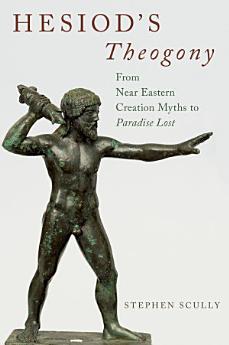Hesiod's Theogony: from Near Eastern Creation Myths to Paradise Lost
Stephen Scully
Aug 2015 · Oxford University Press
Ebook
400
Pages
family_home
Eligible
info
reportRatings and reviews aren’t verified Learn More
About this ebook
Stephen Scully both offers a reading of Hesiod's Theogony and traces the reception and shadows of this authoritative Greek creation story in Greek and Roman texts up to Milton's own creation myth, which sought to "soar above th' Aonian Mount [i.e., the Theogony]...and justify the ways of God to men." Scully also considers the poem in light of Near Eastern creation stories, including the Enûma elish and Genesis, as well as the most striking of modern "scientific myths," Freud's Civilization and its Discontents. Scully reads Hesiod's poem as a hymn to Zeus and a city-state creation myth, arguing that Olympus is portrayed as an idealized polity and--with but one exception--a place of communal harmony. This reading informs his study of the Theogony's reception in later writings about polity, discord, and justice. The rich and various story of reception pays particular attention to the long Homeric Hymns, Solon, the Presocratics, Pindar, Aeschylus, Aristophanes, and Plato in the Archaic and Classical periods; to the Alexandrian scholars, Callimachus, Euhemerus, and the Stoics in the Hellenistic period; to Ovid, Apollodorus, Lucian, a few Church fathers, and the Neoplatonists in the Roman period. Tracing the poem's reception in the Byzantine, medieval, and early Renaissance, including Petrarch and Erasmus, the book ends with a lengthy exploration of Milton's imitations of the poem in Paradise Lost. Scully also compares what he considers Hesiod's artful interplay of narrative, genealogical lists, and keen use of personified abstractions in the Theogony to Homeric narrative techniques and treatment of epic verse.
About the author
Stephen Scully is Associate Professor of Classical Studies at Boston University. He has published on Homer, Hesiod, Sophocles, Plato, Vergil, George Chapman, and Freud. His books include Homer and the Sacred City, Euripides' Suppliant Women, with Rosanna Warren, translation, essay, and notes, and Plato's Phaedrus, translation, essay, and notes.
Rate this ebook
Tell us what you think.
Reading information
Smartphones and tablets
Install the Google Play Books app for Android and iPad/iPhone. It syncs automatically with your account and allows you to read online or offline wherever you are.
Laptops and computers
You can listen to audiobooks purchased on Google Play using your computer's web browser.
eReaders and other devices
To read on e-ink devices like Kobo eReaders, you'll need to download a file and transfer it to your device. Follow the detailed Help Center instructions to transfer the files to supported eReaders.






